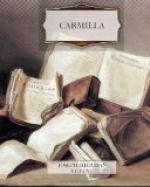“And this was once the palatial residence of the Karnsteins!” said the old General at length, as from a great window he looked out across the village, and saw the wide, undulating expanse of forest. “It was a bad family, and here its bloodstained annals were written,” he continued. “It is hard that they should, after death, continue to plague the human race with their atrocious lusts. That is the chapel of the Karnsteins, down there.”
He pointed down to the grey walls of the Gothic building partly visible through the foliage, a little way down the steep. “And I hear the axe of a woodman,” he added, “busy among the trees that surround it; he possibly may give us the information of which I am in search, and point out the grave of Mircalla, Countess of Karnstein. These rustics preserve the local traditions of great families, whose stories die out among the rich and titled so soon as the families themselves become extinct.”
“We have a portrait, at home, of Mircalla, the Countess Karnstein; should you like to see it?” asked my father.
“Time enough, dear friend,” replied the General. “I believe that I have seen the original; and one motive which has led me to you earlier than I at first intended, was to explore the chapel which we are now approaching.”
“What! see the Countess Mircalla,” exclaimed my father; “why, she has been dead more than a century!”
“Not so dead as you fancy, I am told,” answered the General.
“I confess, General, you puzzle me utterly,” replied my father, looking at him, I fancied, for a moment with a return of the suspicion I detected before. But although there was anger and detestation, at times, in the old General’s manner, there was nothing flighty.
“There remains to me,” he said, as we passed under the heavy arch of the Gothic church—for its dimensions would have justified its being so styled—“but one object which can interest me during the few years that remain to me on earth, and that is to wreak on her the vengeance which, I thank God, may still be accomplished by a mortal arm.”
“What vengeance can you mean?” asked my father, in increasing amazement.
“I mean, to decapitate the monster,” he answered, with a fierce flush, and a stamp that echoed mournfully through the hollow ruin, and his clenched hand was at the same moment raised, as if it grasped the handle of an axe, while he shook it ferociously in the air.
“What?” exclaimed my father, more than ever bewildered.
“To strike her head off.”
“Cut her head off!”
“Aye, with a hatchet, with a spade, or with anything that can cleave through her murderous throat. You shall hear,” he answered, trembling with rage. And hurrying forward he said:
“That beam will answer for a seat; your dear child is fatigued; let her be seated, and I will, in a few sentences, close my dreadful story.”
The squared block of wood, which lay on the grass-grown pavement of the chapel, formed a bench on which I was very glad to seat myself, and in the meantime the General called to the woodman, who had been removing some boughs which leaned upon the old walls; and, axe in hand, the hardy old fellow stood before us.




